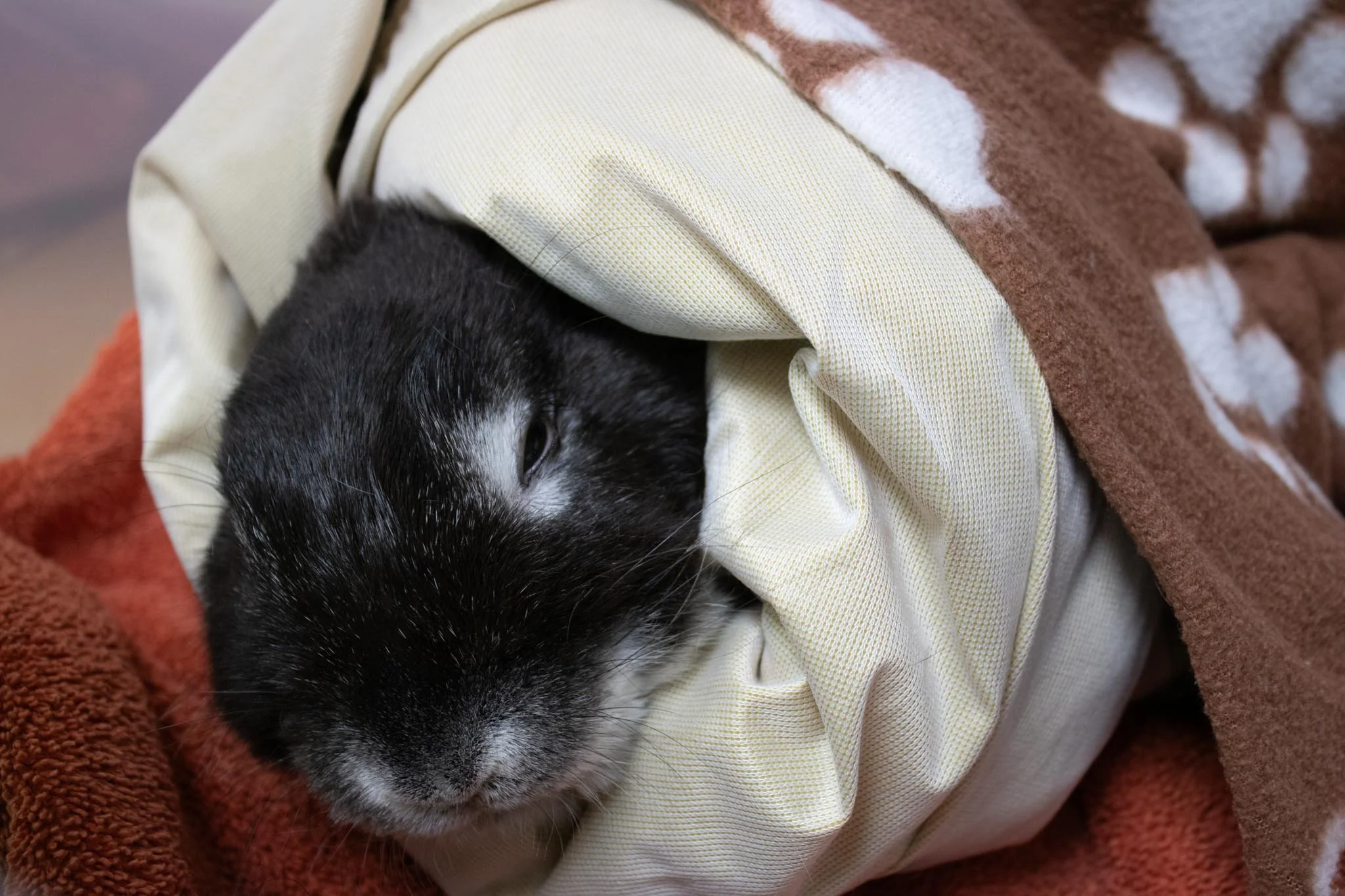
Rabbit Spay and Neuter Surgery
One of the best ways to ensure your rabbit’s life long health and happiness is to have them spayed or neutered. The benefits help ensure both your and your rabbit and live harmoniously for years to come.
Benefits of spaying and neutering
Preventing accidental litters: Rabbits are “induced ovulators” meaning that the female will release eggs from their ovaries when an unfixed male is nearby. Unfixed female rabbits can have a litter of 1 to 12 kits every 30 days and in the home setting, do not experience birth “seasons.” If your unfixed female was mounted by an unfixed male, even for a brief period of time, she is likely pregnant.
Behavior: Spaying or neutering a rabbit greatly reduces hormone production. In doing so, many behavioral problems are curbed such as biting, scratching, or poor litterbox habits. Most rabbits with bad litterbox habits are not fixed.
Preventing cancers: spaying and neutering eliminates the risk of cancers such as uterine, ovarian, and testicular cancers. Studies indicate that female rabbits in particular run a high risk of developing reproductive based cancers as they age (between 40% to 80% depending on age).
Easier to bond: Rabbits who are fixed tend to be less territorial when being introduced to other rabbits. We do not recommend introducing 2 unaltered rabbits as their likelihood of injury is high.
Requirements for spay and neuter
Every veterinary practice will have different requirements for when a rabbit is ready for spay or neuter surgery. These requirements will be dependent on the veterinary clinics staffing, the veterinarian’s comfort level with rabbit surgery, age* and the overall health of the rabbit. In general, most rabbits are ready for spay or neuter when:
The female rabbit is 5 months or older
The male rabbit’s testicles have descended (around the 2.5 - 3 month age)
The rabbit is of a healthy weight
The rabbit does not have a diagnosed heart condition
*Note that as all mammals age, the probability of complications due to anesthesia increases. Some veterinarians may have a maximum rabbit age that they feel comfortable performing surgery due to these increased risks.
How to prepare for surgery
There are a few things to keep in mind when preparing your rabbit for their spay or neuter surgery.
Unlike cats and dogs, rabbits do not need to be fasted before surgery. Be sure to feed your rabbit dinner the night before and breakfast the morning of their surgery.
Line your rabbit’s carrier with a fresh towel or blanket. This will help keep the surgery site clear of potential bacteria post surgery.
Send a small sample of your rabbit’s food pellets along with them to their appointment. This ensures that your rabbit has a food source they like immediately upon awakening from surgery.
Clean your rabbit’s living space the morning of the surgery. This includes washing blankets or towels, wiping down bowls or toys and swapping in a fresh litterbox. This helps limit the exposure to bacteria post surgery.
Have on-hand Critical Care, fresh greens, a digital baby thermometer and a warming pad to keep your rabbit comfortable in case there are complications post surgery.
Have a list of emergency clinics on hand that see rabbits if there are complications post surgery and your primary veterinary clinic is closed.
Post surgery
Every clinic will have a different set of aftercare instructions for you to follow post surgery. Be sure to follow your veterinarian's advice and administer any medications given during the timeframes outlined. Our general advice for post surgery care for the 10 days after surgery are as follows:
Offer food to your rabbit as soon as you arrive home. Make sure your rabbit is eating, drinking, peeing and pooping within 48 hours. If not, call your regular vet immediately. Emergency vet recommendations are on the back.
Prolonged lack of appetite, and/or extreme lethargy (e.g., sleepy, won’t get up) after surgery may indicate a problem. Take your rabbit to a vet immediately if this happens.
Check incision daily for swelling, discharge, redness, openings.
Do not let your rabbit excessively lick/chew at the incision. Most rabbits do not which is why e-collars are rarely sent home with rabbits post surgery. However, it is important to be sure that your rabbit does not experience irritation caused by the sutures that can lead to them licking or chewing the surgical site.
Confine your rabbit indoors in a clean, dry, and quiet environment for at least 10 days, to ensure the incision on the rabbit’s underside stays clean and dry. Discourage running, jumping, and playing. House Rabbit Society believes that rabbits should live inside the home, for their safety and health, but it is essential that they are indoors during surgical recovery. A 4ft by 4ft puppy exercise pen is a great size for post surgery recovery.
Keep bonded pairs together. Only separate from a rabbit companion if necessary.
Male (Neuters Only): Males have stored sperm and are still fertile for up to 30 days after surgery. They should be kept apart from intact female rabbits for at least 30 days.

